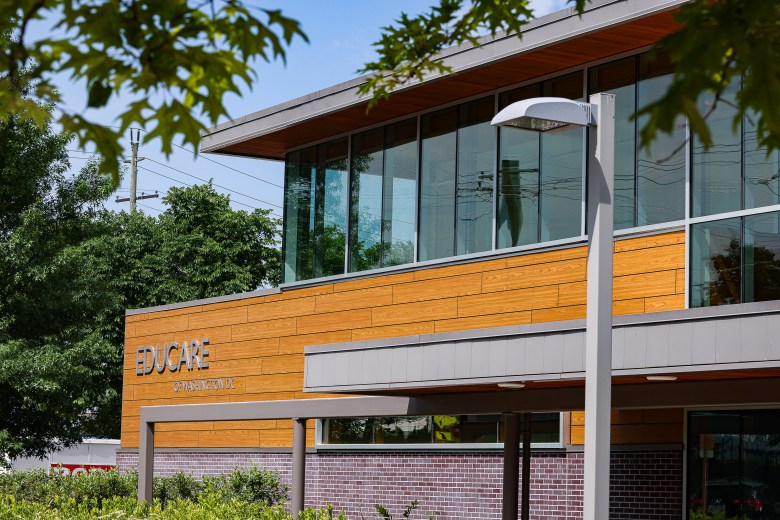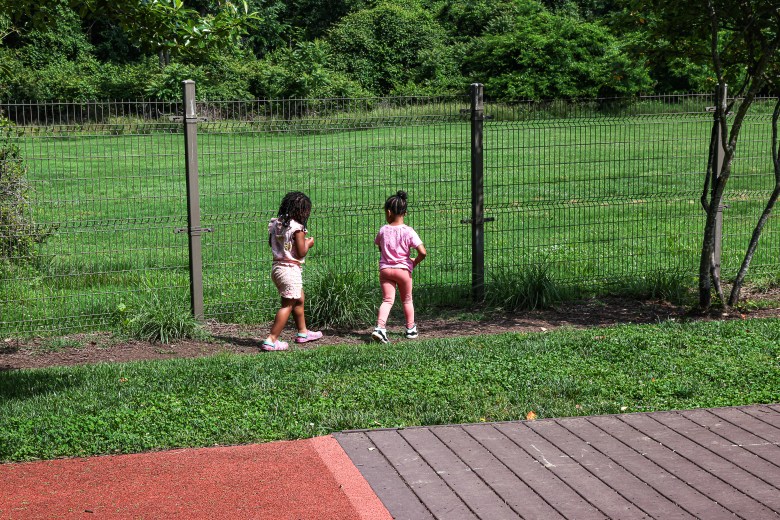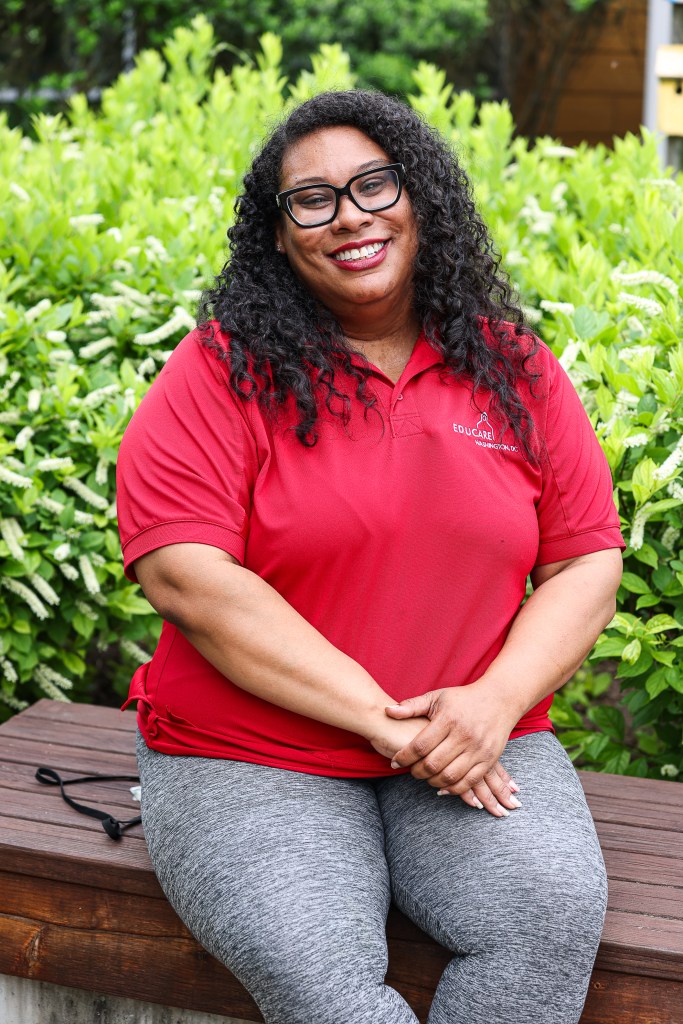Update
The D.C. city council voted in June to preserve the child care educator pay equity fund. The program will be funded at $70 million.
WASHINGTON, D.C. — Jacqueline Strickland has spent nearly her entire life caring for children in Washington, D.C., starting at age 7, when she began babysitting her siblings after school, and then more formally at 14, when she began working at a daycare center.

Despite the low pay, Strickland, 59, has stuck with her career, even as colleagues left child care for better-paying jobs at the post office or driving school buses.
“People look at child care providers as, you know, babysitters,” Strickland said. “But early childhood is the foundation. It’s the most important part of a child’s life because of the brain development that takes place.”
Three years ago, the financial landscape changed. Her salary jumped from $57,000 to $75,000 a year, thanks to a massive experiment underway in the nation’s capital, which seeks to solve one of the major drivers of the child care crisis: Most educators don’t make a livable wage.
The city-funded $80 million Early Childhood Educator Pay Equity Fund has been transformational for district child care providers like Strickland; they’ve been able to pay down credit cards, move into new apartments, buy or pay off cars, schedule overdue dental procedures, help care for family members and even buy first homes.
But earlier this year, the roughly 4,000 early educators who have benefited from the pay equity program were dealt a blow by Mayor Muriel Bowser’s 2025 budget proposal. Bowser is suggesting eliminating funding for the program — along with cuts to other agencies — because of a requirement from the District of Columbia’s chief financial officer that the city replenish its depleted reserve fund, she said. That would mean a pay cut for the people who have already received a salary bump.

The budget is scheduled to be approved by the D.C. Council in June. The mayor’s office did not return a request for comment about her proposal.
Strickland, who had started the process of buying a home, has now put it on hold. She said that, before the equity fund, she had been waiting for the city to do right by child care providers like her.
“Just to be able to know that you can meet your monthly bills on time and not juggle money. To know that you can buy groceries and buy medication. To be able to afford healthcare and go to the doctor. To be able to put a little aside for retirement. I feel like I’m healthier because I don’t have to stress as much,” said Strickland, who works at an Educare center in the city’s Deanwood neighborhood.
If the mayor’s budget proposal comes to fruition, Strickland will go back to waiting.
Even before the Covid-19 pandemic toppled the country’s long-eroding child care system, policymakers in Washington had a vision for tackling the sector’s most intractable challenges, including access, recruitment, retention and pay.
That vision resulted in the pay equity fund, passed by the D.C. Council in 2021. It provides supplemental payments to teachers in licensed child development centers and homes, with the goal of bumping up their pay to match the minimum salaries of D.C. public school teachers with the same credentials. The program has been funded through a tax on residents earning more than $250,000 a year.
Related: Our biweekly Early Childhood newsletter highlights innovative solutions to the obstacles facing the youngest students. Subscribe for free.
“It’s one piece of a larger law and larger suite of investments meant to support the whole child,” said Anne Gunderson, a senior policy analyst at the D.C. Fiscal Policy Institute. “Specifically, it’s a compensation program meant to disrupt pervasive and centuries-long undervaluing of caregiving, where, due to structural racism and sexism, that’s really disproportionately harming Black and brown women.”
The pay equity program requires teachers to earn more advanced certificates and degrees if they want their salaries to increase. The costs of their tuition and books are covered almost entirely by a child care scholarship from the district in tandem with the pay equity program.
Although the mandate to earn more credentials can be taxing and eats into the time early educators can spend caring for their own families, more than a dozen teachers interviewed for this story said it’s well worth the effort.

Artia Brown, who has been working at the Educare center in Washington’s Parkside neighborhood for 10 years, graduated with her associate degree this year from Trinity Washington University and is already enrolled in classes in the bachelor’s degree program. She plans to get her master’s degree and doctorate as well.
“I have a long journey ahead of me, but the pay equity really motivated me to go back to school and to make sure I get as much credentialing as I can,” Brown said. “It will pay a livable wage, and people are starting to understand how important early education is.”
The 41-year-old, who lives in Montgomery County, Maryland, with her college student son, saw her salary increase from $27,000 before the pay equity program to roughly $37,000 with the supplemental funding. It’s allowed her to pay off her car, start saving and support her two nieces.

The pay equity program also provides funding for child care facilities to offer free or low-cost health insurance to educators and other staff.
“Really what we’re seeing for the first time is an appropriate level of compensation and benefits for a workforce that has really been ignored for far too many years,” Gunderson said.
Early data suggests that the pay equity program has helped the city hire, recruit and retain child care employees.
The research firm Mathematica found that, by the end of 2022, the program’s initial payments had increased child care employment levels in Washington by about 100 additional educators, or 3 percent. Moreover, nearly 2 in 3 educators said that, because of the program, they intend to work in the sector longer than they’d previously planned.

And the program’s impact has continued to grow. Comparing child care employment data from the Bureau of Labor Statistics between 2019 and 2023, Mathematica associated the program with an increase of 219 educators, or nearly 7 percent.
Child care center directors said that they believed the program’s payments were not only influencing their “best” educators’ decisions to stay at their centers, but helping them recruit qualified educators.
Early anecdotal data from the Urban institute shows that quality has increased alongside educator pay. When researchers asked early educators about the statement “Because of the Pay Equity Fund payments, I can better focus on the needs and development of children I work with,” 71 percent somewhat or strongly agreed.
Related: States stuck trying to fix early ed pay as feds drop the ball
Washington’s efforts to tackle pay equity in the child care sector are unique. While several states began experimenting with increasing the pay of child care employees following the pandemic, they’ve mostly focused on one-time bonuses, with funding from federal pandemic aid, rather than long-term solutions. Maine’s $30 million program, which provides an average monthly stipend of $400 to educators, is one of the largest responses from other states or cities, but doesn’t come close to matching the reach of Washington’s pay equity fund.
“It is really systems reform in a way that I don’t think other states have approached,” said Erica Greenberg, senior fellow at the Urban Institute’s Center on Education Data and Policy.
Because of the unique nature of the program, Greenberg says that there’s been deep interest from the federal government, states, cities, counties, philanthropists and advocates — all of whom are trying to keep the child care sector afloat.
“They all want to understand how to do something like this,” she says. “D.C. has really been a beacon in that way.”
Yet, as with the rollout of any major new policy, the equity fund has had its share of implementation hiccups.
Chief among them — at least from the educators’ perspective — is that it has sometimes been a hassle to get the money they are due. In 2024, for example, the program switched from making direct payments to teachers to disbursing the money to child care providers, who were then in charge of getting the money to their employees. And the requirements to opt into the program can pose major financial hurdles for smaller centers and home-based providers.
Beyond the particular operating challenges, however, is the program’s solvency.
As educators earn more advanced credentials, the District of Columbia must pay them more — as much as $114,000 for the highest degree earners. As child care centers recruit more teachers, the costs will continue to rise. The mayor considers the natural growth of the program unsustainable, advocates say they’ve been told.
“What I would say is cutting the program or eliminating the program is what’s unsustainable,” said Adam Barragan-Smith, advocacy manager at Educare DC. “The early childhood system in this country is a market failure. Families can’t pay any more. Programs cannot pay teachers any less. The fund has been a really important and game-changing investment so that we don’t have to pass any costs on to families, and we are able to pay teachers what they deserve.”

Amber Hodges, 36, is a lead teacher at Bright Beginnings, a center in the southeast quadrant of the city. When her salary went from roughly $43,000 to $52,000 annually, she used the money to buy a car, move into a nicer apartment building closer to work and take her five nieces and nephews back-to-school shopping.
The supplemental funding makes her feel like, finally, after so many years in the industry, the work of early childhood educators is getting the respect it deserves.
“We have the most important age group, and a lot of people just look at us and say, ‘Oh, you’re daycare teachers or babysitters,’” she said. “There is nothing worse for me when you say that to me. What? I am not a babysitter. Not a babysitter. At all.”
This story about D.C. child care was produced by The Hechinger Report, a nonprofit, independent news organization focused on inequality and innovation in education. Sign up for the Hechinger newsletter.



